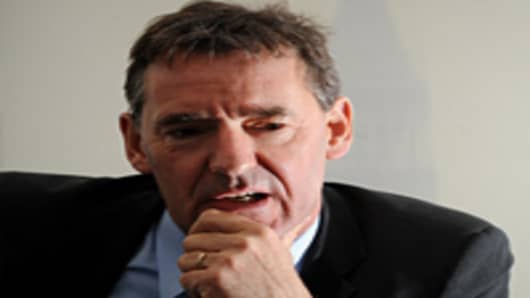The world economy is on the mend despite problems in Europe, but investors are still scared and react by retreating to cash every time they hear bad news, Jim O'Neill, chairman at Goldman Sachs Asset Management, told CNBC on Tuesday.
Investors are "obsessed" with the problems in Western economies, but actually the U.S. economy is recovering, and in Europe there are some countries that are doing better than others, O'Neill said.
"Generally speaking, cash is king; people are really reluctant and cautious," he said, citing the example of last week, when at the first sign of disappointment in Europe after some bad economic data investors were in a "panic." "That is the mood across the board," O'Neill added.
This mood makes it hard for investors to get back into stock markets because the focus is on short-term results, he explained.
"At the core of it, everybody worries about the next quarter and, linked to it, the volatility of last year is what scared a lot of longer-term investors. It's tough for a lot of pension fund trustees to live through that," O'Neill said.
Added to this is the fact that the past decade has been weak for stock markets so "there's a broad anti-equity culture out there," he said, but added that the prospects for stocks are good.
"I continue to see the world glass more half full than empty… on the account that the U.S. is on the way back, as it has been for some time."
Improvement in Europe
In Europe, there are signs that in some of the periphery countries, which sparked fears of the debt crisis spreading, things are improving, with Ireland taking steps to boost its economy and Italy's Prime Minister Mario Monti working hard to introduce much-needed structural reforms, according to O'Neill.
"If you look really closely at the troubled markets, there has been some distinction," he said. "What goes on in Italy itself is the key to the whole European project."
Analysts have long said that politicians in the European Union must present a more coherent message regarding the reforms they intend to implement and the steps that are to be taken to boost growth.
"The PR coming out of European policymakers is still not great," O'Neill said.
The situation in the euro zone's growth engine, Germany, might change as unions push for higher wage deals, he warned.
"German unions are feeling it's payback time. This is a very different German [labor] market for much of my career,” he said. “It's very vibrant. I'm not surprised to see that the unions are pushing at the edge."
Germany's success is starting to show in the fact that there are some signs of a pick-up in the country’s property sector and maybe it's time that the nation "should be accepting some higher inflation," O'Neill said.
A big problem for the euro zone is the fact that the workforce is not fully flexible, which makes it hard for unemployed engineers for instance from countries like Spain and Greece to move temporarily to successful Germany, said O'Neill, echoing findings from a recent OECD survey.
Look to Politics and BRICs
Investors should follow global political situations closely, as that’s a corner where risks are likely to come from, according to analysts.
"I can see May and early summer as being an area to be a bit careful," said O'Neill.
Talk about protectionist measures and changes to the EU's fiscal compact – a plan to rein in budget deficits and introduce more fiscal discipline, especially in the euro zone – have rattled investors' nerves ahead of the French presidential elections, the first round of which is scheduled for the end of April and the second at the beginning of May.
Greek parliamentary elections are also due in that period, and investors are growing more restless about the changes in China, where on March 15 Communist Party leadership contender Bo Xilai was toppled from his position as head of the city of Chongqing, in a move seen by analysts as exposing a rift in ideology ahead of a change in power in China later this year at the 18th Communist Party congress.
"I worry that there's some elements of China's politics that one can't understand in the West," O'Neill said, but added that he believed the upcoming changes were "good for those who believe in further change and reform."
Apart from politics two more things are worrying investors when it comes to China, he explained. The first is the fact that China plans to grow by only between 7 and 8 percent, but O'Neill doesn't see that as a "big issue," given that such growth would still be higher than that in most other big economies.
The second reason for worry is the policy of swelling salaries in China, with government statistics showing average monthly wages increasing by 13.3 percent between 2009 and 2010.
O'Neill, who coined the term BRICs to mean the fast-growing, big emerging markets of Brazil, Russia, India and China, said that in Brazil investors fear that the central bank is behind the curve as growth stays sluggish by recent Brazilian standards.
"Their problem is their currency is far too strong. And there's an underlying clash of fiscal and monetary policy, which is why the currency is so strong," he explained, but added: "Actually in the fourth quarter, Brazil came through a bit stronger than people expected. It only needs to grow between 4-5 percent. It will never grow by Chinese or Indian rates."



